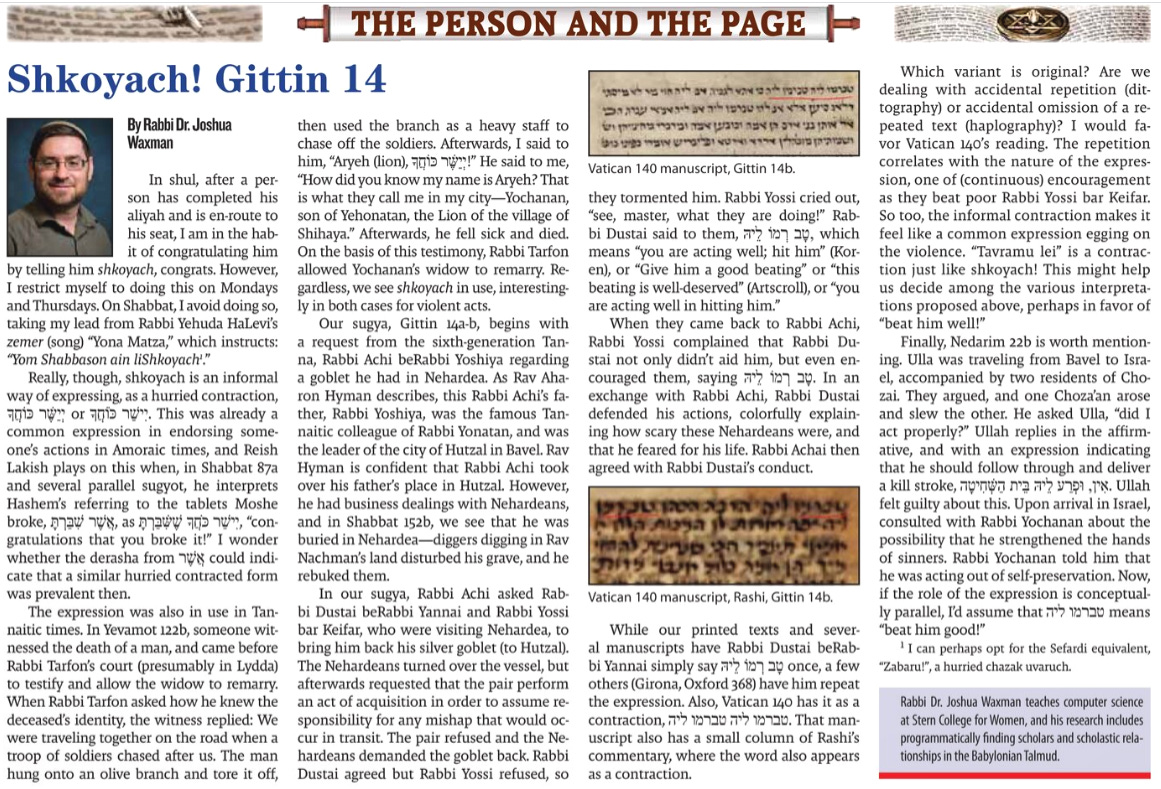Shkoyach article summary
Here is my article from this past Shabbat in the Jewish Link (flipdocs, HTML, paywalled Substack).
A quick rundown of the ideas.
A joke about Yom Shabbason ain li-shkoach
It goes something like yishar kochacha → yasher koach → she-koach → shkoach
But the slurring contraction is because it is a common expression. We have Reish Lakish darshen “asher shibarta” as yeyasher kochacha that you shattered the luchos. So perhaps even Resh Lakish, in seeing asher as shkoyach was exposed to a contracted form. And we see it in use in a Tannaitic story, where the witness in Rabbi Tarfon’s court had said to the deceased יישר כוחך in fighting off a band of soldiers. Perhaps shkoyach is used in reference to positive acts of strength and violence.
In our sugya in Gittin 14a-b, an interesting and colorful story that I abbreviated in the article. So why not include it here?
רַבִּי אַחַי בְּרַבִּי יֹאשִׁיָּה הֲוָה לֵיהּ אִיסְפְּקָא דְכַסְפָּא בִּנְהַרְדְּעָא,
The Gemara further relates: Rabbi Aḥai, son of Rabbi Yoshiya, had a silver vessel [ispeka] in the city of Neharde’a.
אֲמַר לְהוּ לְרַבִּי דּוֹסְתַּאי בַּר רַבִּי יַנַּאי וּלְרַבִּי יוֹסֵי בַּר כֵּיפַר: בַּהֲדֵי דְּאָתֵיתוּ, אַתְיוּהּ נִיהֲלִי. אֲזוּל, יַהֲבֵיהּ נִיהֲלֵיהּ. אָמְרִי לְהוּ: נִקְנֵי מִינַּיְיכוּ; אָמְרִי לְהוּ: לָא. אָמְרִי לְהוּ: אַהְדְּרֵיהּ נִיהֲלַן.
Rabbi Aḥai said to Rabbi Dostai bar Rabbi Yannai and to Rabbi Yosei bar Keifar: When you come from Neharde’a bring the vessel to me. They went to Neharde’a and the people who were in possession of the vessel gave it to them. After handing over the vessel, those people said to them: Let us perform an act of acquisition with you, so that you will be responsible for the vessel until you reach Rabbi Aḥai. The agents said to them: No; we do not want to do this. They said to them: If so, return the vessel to us, as we do not wish to transfer it in such a manner that we retain responsibility.
רַבִּי דּוֹסְתַּאי בְּרַבִּי יַנַּאי אֲמַר לְהוּ: אִין; רַבִּי יוֹסֵי בַּר כֵּיפַר אֲמַר לְהוּ: לָא. הֲווֹ קָא מְצַעֲרוּ לֵיהּ, אֲמַר לֵיהּ: חֲזִי מָר הֵיכִי קָא עָבֵיד! אֲמַר לְהוּ: טָב רְמוֹ לֵיהּ.
Rabbi Dostai, son of Rabbi Yannai, said to them: Yes, I am willing to return it. However, Rabbi Yosei bar Keifar said to them: No, as you do not have the right to retract in this situation. They tormented Rabbi Yosei bar Keifar to force him to agree to return the vessel. Rabbi Yosei bar Keifar said to Rabbi Dostai: See, my Master, what they are doing to me. Rabbi Dostai said to them: You are acting well; hit him.
כִּי אֲתוֹ לְגַבֵּיהּ, אֲמַר לֵיהּ: חֲזִי מָר, לָא מִיסָּתְיֵיהּ דְּלָא סַיְּיעַן, אֶלָּא אֲמַר לְהוּ נָמֵי ״טָב רְמוֹ לֵיהּ״! אֲמַר לֵיהּ: אַמַּאי תֶּיעְבֵּד הָכִי?
When these two agents came before Rabbi Aḥai, Rabbi Yosei bar Keifar said to him: See, my Master, not only did Rabbi Dostai not support me; rather, he even said to them: You are acting well; hit him. Rabbi Aḥai said to Rabbi Dostai: Why did you do this?
אֲמַר לֵיהּ: אוֹתָן בְּנֵי אָדָם – הֵן אַמָּה, וְכוֹבָעָן אַמָּהּ, וּמְדַבְּרִין מֵחֶצְיֵיהֶן, וּשְׁמוֹתֵיהֶן מְבוֹהָלִין: ׳אַרְדָּא׳ וְ׳אַרְטָא׳ וּ׳פִילֵי בְּרֵישׁ׳; אוֹמְרִין ״כְּפוֹתוּ״ – כּוֹפְתִין; אוֹמְרִין ״הֲרוֹגוּ״ – הוֹרְגִין; אִילּוּ הָרְגוּ אֶת דּוֹסְתַּאי, מִי נָתַן לְיַנַּאי אַבָּא בַּר כְּמוֹתִי.
Rabbi Dostai said to him: Those people who were in possession of the vessel, they are the size of a cubit, and their hats were a cubit, and they spoke from their midpoints, and their names were frightening: Arda and Arta and Pili Bereish. If one were to say to them: Restrain this person, they would restrain him. If one were to say to them: Kill him, they would kill. Had they killed Dostai, i.e., me, who would give Yannai, my father, another son like me?
אֲמַר לֵיהּ: בְּנֵי אָדָם הַלָּלוּ קְרוֹבִים לַמַּלְכוּת הֵן? אָמַר לֵיהּ: הֵן. יֵשׁ לָהֶן סוּסִים וּפְרָדִים שֶׁרָצִים אַחֲרֵיהֶן? אֲמַר לֵיהּ: הֵן. אֲמַר לֵיהּ: אִי הָכִי, שַׁפִּיר עֲבַדְתְּ.
Rabbi Aḥai said to him: Are these people close to the government? Rabbi Dostai said to him: Yes. Rabbi Aḥai asked him: Do they have horses and mules that run after them, i.e., do they have servants to perform their bidding? Rabbi Dostai said to them: Yes. Rabbi Aḥai said to him: If so, you acted well, as the situation was entirely out of your control.
Then,
A bit of biography of Rabbi Achi veRabbi Yoshiya
In this story, the ambiguity of the expression טָב רְמוֹ לֵיהּ. Does it mean — you are acting well; hit him? Or does it mean “beat him well!” ?
The Vatican 140 manuscript, in the main column and in Rashi’s citation, has טברמו ליה as a contracted form. I think this pushes us towards the latter interpretation.
Here are the images from Vatican 140, by the way:




